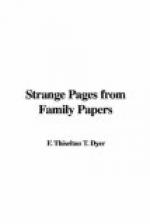This emphatic malediction is cited by Hume of Godscroft in his “History of the House of Douglas,” as referring to William, sixth Earl of Douglas, a youth of eighteen; and Hume, speaking of this transaction, says, with becoming indignation: “It is sure the people did abhorre it—execrating the very place where it was done, in detestation of the fact—of which the memory remaineth yet to our dayes in these words.”
Many similar stories are recorded in the history of the past, the worst form of treachery oftentimes lurking beneath the festive cup, and in times of commotion, when suspicion and mistrust made men feel insecure even when entertained in the banqueting hall of some powerful host, it is not surprising that great persons had their food tasted by those who were supposed to have made themselves acquainted with its wholesomeness. But this practice could not always afford security when the taster was ready to sacrifice his own life, as in King John (act v. sc. 6):
Hubert. The king, I fear, is
poisoned by a monk:
I
left him almost speechless.
Bastard. How did he take it? Who did taste to him?
Hubert. A monk, I tell you; a resolved villain.
But, in modern days, one of the most unnatural tragedies on record was the murder of Sir John Goodere, Foote’s maternal uncle, by his brother Captain Goodere, a naval officer. In the year 1740, the two brothers dined at a friend’s house near Bristol. For a long time they had been on bad terms, owing to certain money transactions, but at the dinner table a reconciliation was, to all appearance, made between them. But it was a most terrible piece of underhand treachery, for on leaving that dinner table, Sir John was waylaid on his return home by some men from his brother’s vessel—acting by his brother’s authority—carried on board, and deliberately strangled; Captain Goodere not only unconcernedly looking on, but actually furnishing the rope with which this fearful crime was committed. One of the strangest parts of this terrible tale, Foote used to relate, was the fact that on the night the murder was committed he arrived at his father’s house in Truro, and was kept awake for some time by the softest and sweetest strains of music he had ever heard. At first he fancied it might be a serenade got up by some of the family to welcome him home, but not being able to discover any trace of the musicians, he came to the conclusion that he was deceived by his own imagination. Shortly afterwards, however, he learnt that the murder had been committed at the same hour of the same night as he had been haunted by the mysterious sounds. In after days, he often spoke of this curious occurrence, regarding it as a supernatural warning, a conviction which he retained till his death.




